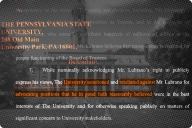You have /5 articles left.
Sign up for a free account or log in.
One of the best aspects of working on a college campus is the enormous number of opportunities to hear knowledgeable people talk about interesting topics. Usually for free. Tonight was one of those opportunities.
Harvard has The Lowell Lecture Series, which is devoted to discussing the major issues of our time. Past Lowell Lectures have featured Gore Vidal, Sherry Turkle, Ken Burns, Doris Kearns Goodwin, James Carroll, Jill Kerr Conway, Carl Sagan, Robert Reich, and Gloria Steinem. This year’s speaker was Andrew Delbanco, recent winner of the National Humanities Medal and Levi Professor in the Humanities at Columbia University. Delbanco is also the author of the recently-released College: As It Was, Is, And Should Be, which formed the basis of his talk.
Delbanco discussed how there is a lot of talk about the importance of access to higher education and how we must raise completion rates, but very little (meaningful) talk about what happens in “the black box” between these two points. As part of this, he lamented the gradual shift from a liberal arts education toward a pre-professional education and all that may be lost in this shift. In particular, we may be steering away from education that encourages introspection, and this is a great loss for both individuals and our society at large. Fair point.
He went on to list many of the commonly known problems in higher education (e.g., faculty are generally rewarded for research over teaching, public universities are being defunded, the rise in the importance of rankings, etc.), and offered no silver bullet for how to fix these issued. Rather, he argued passionately for why we need to fix our universities to ensure access – because education matters.
And why does higher education matter so much? Delbanco listed three arguments:
- Economics. We need an educated workforce so the United States can compete in the global marketplace. Also, educated people tend to live longer, healthier, more productive lives.
- Politics. The Jeffersonian argument that we cannot have a democracy without an educated citizenry. Educated citizens have a well-functioning “BS meter” and can make better, more informed decisions.
- Life. Education opens our eyes to new ideas, new approaches. It teaches us how to think and how to choose. It teaches us how to understand universal truths, make sense of life, make better choices, and appreciate art. It helps us enjoy life.
The first two of these arguments are probably familiar, as they’re often used as the reasons why we should continue to publicly support higher education. The third argument, however, made me reflect on my time as an undergraduate. While it may have been the degree in Business Administration that got me the job right out of college, it was my time living in International House at UC Berkeley that changed my life and a remarkable class called Forms of Folklore, taught by Alan Dundes, that changed the way I interpreted different cultures. I continue to use what I learned at International House and in Dundes’s class nearly every day. They made all the difference.
We talk so much about the value of education, but what does it mean to be “educated.” What should someone know to be considered “educated?” What was it in your college (or graduate) studies that made all the difference?





